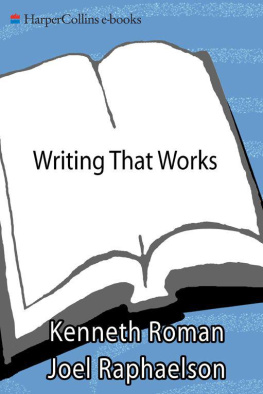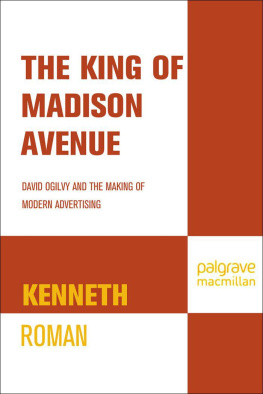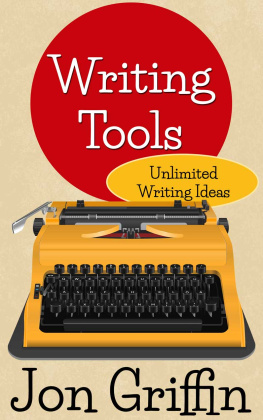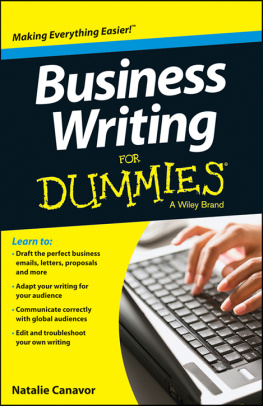The first edition of this book was written on a typewriter; we delivered a typed manuscript to the publisher. We wrote the second edition on computers and delivered a printed manuscript. This edition was written on computers and e-mailed to our editorno manuscript, not even disks.
That illustrates one of the changes in the way people communicate that propelled us to undertake a thorough revision. E-mail has become so ubiquitous that we added a chapter and revised several others to take full account of its influence. Another change in recent years is the fading of the internal memo displaced in many uses by e-mail, in others by the presentation deck.
Our purpose, however, remains unchanged. We wrote the book to help those millions of nonprofessional writers who must use the written word to get results in business, in government, in education, in the arts. Thats still our goal.
Nor have we found any cause to abandon the principles we espouse. To the contrary, the speed and ease of e-mail and word processing serve as an invitation to sloppy writing. Replacing paper with a PC screen doesnt change the need for clear, precise communication. And replacing a formal memo with a bullet-pointed presentation deck doesnt justify loose thinking.
In the second edition, we introduced some thoughts on how to avoid the pitfalls of sexist language. We have expanded those thoughts into a separate chapter on political correctness and the extent to which it should or should not influence the way you write.
Throughout the book, we have freshened examples and sharpened points by practicing what we preach about editing. Coming from a world of thirty-second commercials has trained us to cut to the essence and helped keep this book slim and our message accessible.
Nothing that follows is academic or theoretical. You will find advice you can act on, whenever you have to convert empty screen or blank paper into a letter, a memo, a report, a recommendation, a proposal, a speech, a resume. Youll get help from specific side-by-side examples of good writing versus bad.
Generations ago the telephone killed the art of executive writing. Now its poised for a comeback, reports The Wall Street Journal, noting that e-mail sends everyone to a keyboard. No wonder companies institute writing courses.
Effective writing is hard work even for the best writers (and even on a computer), but the principles are simple. They dont require unusual talent or special skills. They are easy to understand and easy to put into use. What you do need is a degree of determination the perseverance to be sure youve said what you want to say. This book aims to help you do that with less difficulty and more confidence, and get the results youre looking for from everything you write.
Too many of the communications I get are meaningless, observes a leading CEO. They dont help me understand what action the writer wants me to take. They waste my time.
We could fill a dozen pages with complaints of this sort. Unclear, poorly written, or confusing is the verdict of vice presidents of two hundred major U.S. companies on a full third of the business writing they confront. New Yorks Commissioner of Education, frustrated that so many of the letters and memos passing through his office were confusing or did not answer questions quickly enough, ordered his 250 top officials to take a course in writing. And so it goes. It adds up to a chorus of laments that so few people can put a thought into words that make it clear, state it precisely, and take no more of the readers time than is called for.
Yet clarity, desirable as it is, is not the goal. The goal is effective communication writing that works.
What does the reader need to know to comprehend your report and endorse its conclusions? To approve your plan, and pay for it? To respond swiftly to your e-mail? To send money for your charity, your candidate, your product or service? To invite you to a job interview? To make the right business decision?
Youre not likely to get the results you seek if your writing is murky, long-winded, bogged down by jargon, and topsyturvy in its order of thought. Just as unproductive is what two Stanford professors, Jeffrey Pfeffer and Robert I. Sutton, call smart talk. Writing in the Harvard Business Review in 1999, the professors identify smart talk as a major obstacle to taking action in business. A characteristic of smart talk is that it is unnecessarily complicated or abstract (or both). People seldom act on what they cannot understand. Good results are even less likely if you flood the reader with information that isnt organized to lead to an action or isnt relevant to a grasp of the subject.
Even the federal government is starting to recognize the benefits of simple, clear writing. The Securities and Exchange Commission inaugurated the plain-language movement by ordering mutual fund companies to rewrite their prospectuses. The Veterans Benefits Administration trained employees in its insurance division how to write more clearly, and the response rate to its letters increased saving the agency $500,000 a year.
Companies are seeing how confusing communication ties up their service centers, and how clear communications makes them more efficient and competitive.
One executive suggests a discipline putting down first what you want the reader to do, next the three most important things the reader needs to understand to take that action, then starting to write. When youre done, he suggests asking yourself whether if you were the reader, would you take action on the basis of what is written.
People who write well do well
To get action from busy people, your writing must cut through to the heart of the matter. It must require a minimum of time and effort on the readers part. The importance of this increases with the importance of your reader. At any level, readers are likely to be swamped either with paperwork or a twenty-four-hour-a-day stream of e-mail, or both. Junior executives may feel obliged to plow through everything that comes their way. The president doesnt and damned well wont.
A senior executive says this about a client:
His desk is usually absolutely clean, but I know that somewhere in that mans life theres a tremendous pile of paper. If I want him to read the memo himself, Id better get right to the point and Id better be clear, or hell just pass it along to somebody else, with a testy little note asking for a translation.
The better you write, the less time your boss must spend rewriting your stuff. If you are ambitious, it wont hurt to make life easier for people above you. Bad writing slows things down; good writing speeds them up.
The only way some people know you is through your writing. It can be your most frequent point of contact, or your only one, with people important to your career major customers, senior clients, your own top management. To those women and men, your writing is you. It reveals how your mind works. Is it forceful or fatuous, deft or clumsy, crisp or soggy? Readers who dont know you judge you from the evidence in your writing.









